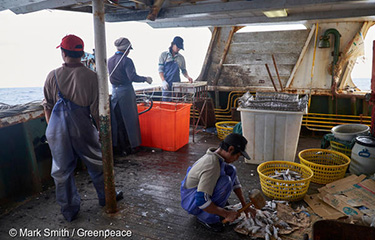Evidence persists of IUU, forced labor in Taiwanese fleet, including on FCF-linked vessels

Greenpeace East Asia is accusing Bumble Bee's parent company, Taiwan-based Fong Chun Formosa (FCF), of forced labor and environmentally harmful practices aboard at least two vessels linked to the company.
FCF is among the top three tuna traders in the world, and acquired Bumble Bee in January after the American seafood company filed for bankruptcy. The two companies have a long history: Prior to the acquisition, FCF had been supplying Bumble Bee with 95 percent of its albacore and more than 70 percent of its light meat tuna, according to Greenpeace's examination of court filings.
The tuna trader doesn’t own vessels, and instead sources from around 600 vessels from Taiwan, China, Fiji, and other countries, Greenpeace said. The company supplies large, well-known tuna brands and manufacturers, including Bumble Bee, Thai Union, and TOREI, which is a top sashimi trader in Japan.
In a new report focused on Taiwan’s distant-water fleet, “Choppy Waters,” Greenpeace outlined how corporations and governments are neglecting to respect and protect migrant fishermen and their human rights, according to Greenpeace East Asia campaigner Pearl Chen. The conditions that Greenpeace uncovered qualify as forced labor, according to international labor standards, and might also violate Taiwanese regulations.
With the acquisition of Bumble Bee, FCF now owns elements in nearly the entire supply chain, and consumers could be buying fish tied to forced labor.
"Once the seafood tainted with forced labor or IUU fishing enters FCF's supply chain, it could soon enter the global market," Chen told SeafoodSource. "The current efforts from this seafood giant are obviously not sufficient to deter such illicit practices, and we need key corporations, including FCF or Bumble Bee, to step up their game to gatekeep the seafood entering into their supply chain."
For the report, Greenpeace interviewed Indonesian migrant fishermen working aboard three vessels flagged or linked to Taiwan, and analyzed fishermen’s contracts and salary slips. There was evidence of forced labor: Excessive overtime, keeping identity documents, and failing to pay wages.
“We only got to sleep for five hours if and when we caught some fish. If we didn’t catch anything, we’d just have to keep working, even for 34 hours straight," one longline fisherman told Greenpeace while at a port frequented by Taiwanese vessels. "If it were possible, I’d like to change how much time we have to work and rest, to meet the needs of human bodies. There’s got to be a way to make it more balanced, just like how people who work on land do it.”
Bumble Bee declined to answer specific questions about the Greenpeace report, and instead outlined its efforts around working conditions, social responsibility, and environmental sustainability.
Bumble Bee said that FCF's Vessel Social Responsibility Program includes direct outreach to vessel owners and managers, plus audits of vessels and fleet offices, including interviews with crew members about safety, recruiting, training, and other topics. The program initially launched with purse-seine vessels and expanded to include longline vessels in the second half of 2019. Audits have taken place in Mauritius and, starting this month, in Fiji.
"The coverage and scope of the vessel audits will continue to grow," Bumble Bee Director of Sustainability Mike Kraft told SeafoodSource.
Taiwan's entire distant-water fleet has been subject to international scrutiny and pressure for its fishing practices. The country had the second-worst score in the world on the Global Initiative Against Transnational Organized Crime’s IUU Fishing Index.
Greenpeace has been documenting harmful environmental practices in Taiwan's distant-water fishing fleet since 2010, and first uncovered abusive labor practices in 2016 with its “Made in Taiwan” report. For that report, Greenpeace interviewed more than 80 migrant fishermen working on Taiwan's distant-water fleet about working conditions and found abusive labor practices. Greenpeace found that IUU fishing tends to be paired with forced labor.
A 2018 Greenpeace report, “Misery at Sea,” found that a Vanuatu-flagged vessel linked to FCF, called Tunago No. 61, was suspected of forced labor. Another report published by Greenpeace Southeast Asia in December, “Seabound,” found evidence of forced labor conditions on multiple Taiwanese vessels. The new report uncovers similar conditions.
"We were not surprised because other NGOs have also been exposing those practices on Taiwanese distant water fishing vessels," Chen said. "With the still-weak enforcement capacity and capability from the Taiwan government and with both the government and corporations allowing the problematic practices – transshipment at sea – to continue, we find it difficult to deter those practices."
The report also alleges that vessels engaged in shark-finning.
“We only kept the fins of the sharks and discarded the rest of their meat," one fishermen told Greenpeace. "Last month, I placed the fins out under the sun to dry, but a few days later, we spotted an American patrol boat. The captain got really scared and told me to hide all the fins so that the Americans wouldn’t find them.”
Bumble Bee said that it has prohibited shark-finning since 2012 and it requires vessels it sources from to have a shark-finning policy in place. Bumble Bee also said that the purse-seiners and longliners from which it sources adhere to best practices for reducing bycatch.
As of this year, about half of Bumble Bee's albacore tuna comes from fisheries engaged in longline fishery improvement projects (FIPs).
"We are committed to expanding this work," Kraft said.
Photo courtesy of Mark Smith/Greenpeace






Share